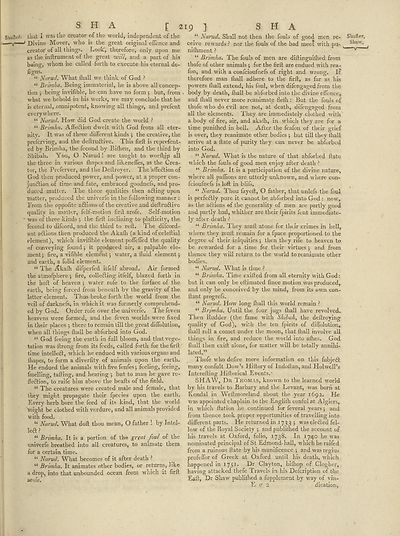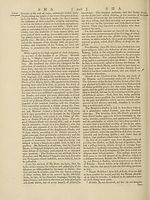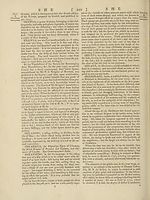Encyclopaedia Britannica, or, a Dictionary of arts, sciences, and miscellaneous literature : enlarged and improved. Illustrated with nearly six hundred engravings > Volume 19, Scripture-SUG
(229) Page 219
Download files
Complete book:
Individual page:
Thumbnail gallery: Grid view | List view

S H A [ 2
Shaitcr. that I was the creator of the world, independent of the
——v"— 1 Divine Mover, who is the great original effcnce and
creator' of all things. Look, therefore, only upon me
as the inftrument of the great wi//, and a part of his
bsing, whom he called forth to execute his eternal de-
figns.
“ Narad. What (hall we think of God ?
“ Brimha. Being immaterial, he is above all concep¬
tion ; being invilible, he can have no form ; but, from .
what we behold in his works, we may conclude that he
is eternal, .omnipotent, knowing all things, and prefent
everywhere.
“ Narad. How did God create the world ?
“ Brimha. Affection dwelt with God from all eter¬
nity. It was of three different kinds ; the creative, the
preferving, and the deftrudtive. This firlt is represent¬
ed by Brimha, the fecond by Bilhen, and the third by
Shibah. You, O Narud 1 are taught to worlhip all
the three in various fhapes and likeneffes, as the Crea¬
tor, the Preferver, and the Deltroyer. The affecffion of
God then produced power, and power, at a proper con-
iumffion of time and fate, embraced goodnefs, and pro¬
duced matter. The three qualities then adting upon
matter, produced the univerfe in the following manner :
From the oppofite aftions of the creative and deffrudtive
quality in matter, felt-motion firit arofe. Self-motion
' was of three kinds ; the firft inclining to plafticity, the
fecond to difcord, and the third to reft. The difeord-
ant atftions then produced the Akaflr (a kind of celeftial
element), which invifible element poffeffed the quality
of conveying found; it produced air, a palpable ele¬
ment j fire, a vilible element j water, a fluid element j
and earth, a folid element.
“ The Akaflr difperfed itfelf abroad. Air formed
the atmofphere *, fire, collecting itfelf, blazed forth in
the hoft of heaven •, water rofe to the furface of the
earth, being forced from beneath by the gravity of the
latter element. Thus broke forth the world from the
veil of darknefs, in which it was formerly comprehend¬
ed by God. Order rofe over the univerfe. The feven
heavens were formed, and the feven worlds were fixed
in their places ; there to remain till the great diffolution,
when all things fliall be abforbed into God.
“ God feeing the earth in full bloom, and that vege¬
tation wTas ftrong from its feeds, called forth for the firft
time intelleft, which he endued with various organs and
fliapes, to form a diverfity of animals upon the earth.
He endued the animals with five fenfes; feeling, feeing,
fmelling, tailing, and hearing •, but to man he gave re-
fledtion, to raife him above the beafts of the field.
“ The creatures were created male and female, that
they might propagate their fpecies upon the earth.
Every herb bore the feed of its kind, that the world
might be clothed with verdure, and all animals provided
with food.
“ Narud. What doft thou mean, O father ! by Intel-
led! ?
u Brimha. It is a portion of the great foul of the
univerfe breathed into all creatures, to animate them
for a certain time.
“ Narud. What becomes of it after death ?
“ Brimha. It animates other bodies, or returns, like
a drop, into that unbounded ocean from which it firft
arofe.
:p ] S H A
“ Narud. Shall not then the fouls of good men re¬
ceive rewards ? nor the fouls of the bad meet with pu-
nilhment ?
“ Brimha. The fouls of men are diftinguifhed from
thofe of other animals; for the firft are endued with rea-
fon, and with a confcioufnefs of right and wrong. I?
therefore man ftiall adhere to the firft, as far as his
powers fliall extend, his foul, when difengaged from the
body by death, fliall be abforbed into the divine cffencc,
and fliall never more reanimate fleih : But the fouls of
thofe who do evil are not, at death, difengaged from
all the elements. They are immediately clothed with
a body of fire, air, and akaih, in which they are for a
time puniftied in hell. After the feafon of their grief
is over, they reanimate other bodies ; but till they {hall
arrive at a ftate of purity they can never be abforbed
into God.
“ Narud. What is the nature of that abforbed ftate
which the fouls of good men enjoy after death ?
“ Brimha. It is a participation of the divine nature,
where all paflions are utterly unknown, and where con-
feioufnefs is loft in blifs.
“ Narud. Thou fayeft, O father, that unlcfs the foul
is perfectly pure it cannot be abforbed into God : now,
as the aflions of the generality of men are partly good
and partly bad, whither are their fpirits fent immediate¬
ly after death ?
“ Brimha. They muft atone for their crimes in hell,
where they muft remain for a fpace proportioned to the
degree of their iniquities \ then they rife to heaven to
be rewarded for a time for their virtues ; and from
thence they will return to the world to reanimate other
bodies.
“ Narud. What is time ?
“ Brimha. Time exifted from all eternity with God:
but it can only be eftimated fince motion was produced,
and only be conceived by the mind, from its own con-
ftant progrefs.
“ Narud. How long fliall this world remain ?
“ Brimha. Until the four jugs ftiall have revolved.
Then Rudder (the fame with Shibah, the deftroying
quality of God), with the ten fpirits of diffolution,
lhall roll a comet under the moon, that fhall involve all
things in fire, and reduce the world into allies. God
fliall then exift alone, for matter will be totally annihi¬
lated.”
Thofe who defire more information on this fubjedl
many confult Dow’s Hiftory of Indoftan, and Holvvell’s
Interefting Hiftorical Events.*
SHAW, Dr Thomas, known to the learned world
by his travels to Barbary and the Levant, was born at
Kendal in Weftmoreland about the year 1692. He
Avas appointed chaplain to the Englilh conful at Algiers,
in which ftation he continued for feveral years; and
from thence took proper opportunities of travelling into
different parts. He returned in 1 733 j wasele&ed fel¬
low of the Royal Society •, and publiftied the account of
his travels at Oxford, folio, 1738. In 1740 he was
nominated principal of St Edmond-hall, which he raifed
from a ruinous ftate by his munificence ; and was regius
profeffor of Greek at Oxford until his death, rvhich
happened in 1751. Dr Clayton, bifliop of Clogher,
having attacked thefe Travels in his Defcription of the
Eaft, Dr SIieav publiftied a fupplement by Avay of vin-
E e 2 dication,
Shader,
Shaw,
Shaitcr. that I was the creator of the world, independent of the
——v"— 1 Divine Mover, who is the great original effcnce and
creator' of all things. Look, therefore, only upon me
as the inftrument of the great wi//, and a part of his
bsing, whom he called forth to execute his eternal de-
figns.
“ Narad. What (hall we think of God ?
“ Brimha. Being immaterial, he is above all concep¬
tion ; being invilible, he can have no form ; but, from .
what we behold in his works, we may conclude that he
is eternal, .omnipotent, knowing all things, and prefent
everywhere.
“ Narad. How did God create the world ?
“ Brimha. Affection dwelt with God from all eter¬
nity. It was of three different kinds ; the creative, the
preferving, and the deftrudtive. This firlt is represent¬
ed by Brimha, the fecond by Bilhen, and the third by
Shibah. You, O Narud 1 are taught to worlhip all
the three in various fhapes and likeneffes, as the Crea¬
tor, the Preferver, and the Deltroyer. The affecffion of
God then produced power, and power, at a proper con-
iumffion of time and fate, embraced goodnefs, and pro¬
duced matter. The three qualities then adting upon
matter, produced the univerfe in the following manner :
From the oppofite aftions of the creative and deffrudtive
quality in matter, felt-motion firit arofe. Self-motion
' was of three kinds ; the firft inclining to plafticity, the
fecond to difcord, and the third to reft. The difeord-
ant atftions then produced the Akaflr (a kind of celeftial
element), which invifible element poffeffed the quality
of conveying found; it produced air, a palpable ele¬
ment j fire, a vilible element j water, a fluid element j
and earth, a folid element.
“ The Akaflr difperfed itfelf abroad. Air formed
the atmofphere *, fire, collecting itfelf, blazed forth in
the hoft of heaven •, water rofe to the furface of the
earth, being forced from beneath by the gravity of the
latter element. Thus broke forth the world from the
veil of darknefs, in which it was formerly comprehend¬
ed by God. Order rofe over the univerfe. The feven
heavens were formed, and the feven worlds were fixed
in their places ; there to remain till the great diffolution,
when all things fliall be abforbed into God.
“ God feeing the earth in full bloom, and that vege¬
tation wTas ftrong from its feeds, called forth for the firft
time intelleft, which he endued with various organs and
fliapes, to form a diverfity of animals upon the earth.
He endued the animals with five fenfes; feeling, feeing,
fmelling, tailing, and hearing •, but to man he gave re-
fledtion, to raife him above the beafts of the field.
“ The creatures were created male and female, that
they might propagate their fpecies upon the earth.
Every herb bore the feed of its kind, that the world
might be clothed with verdure, and all animals provided
with food.
“ Narud. What doft thou mean, O father ! by Intel-
led! ?
u Brimha. It is a portion of the great foul of the
univerfe breathed into all creatures, to animate them
for a certain time.
“ Narud. What becomes of it after death ?
“ Brimha. It animates other bodies, or returns, like
a drop, into that unbounded ocean from which it firft
arofe.
:p ] S H A
“ Narud. Shall not then the fouls of good men re¬
ceive rewards ? nor the fouls of the bad meet with pu-
nilhment ?
“ Brimha. The fouls of men are diftinguifhed from
thofe of other animals; for the firft are endued with rea-
fon, and with a confcioufnefs of right and wrong. I?
therefore man ftiall adhere to the firft, as far as his
powers fliall extend, his foul, when difengaged from the
body by death, fliall be abforbed into the divine cffencc,
and fliall never more reanimate fleih : But the fouls of
thofe who do evil are not, at death, difengaged from
all the elements. They are immediately clothed with
a body of fire, air, and akaih, in which they are for a
time puniftied in hell. After the feafon of their grief
is over, they reanimate other bodies ; but till they {hall
arrive at a ftate of purity they can never be abforbed
into God.
“ Narud. What is the nature of that abforbed ftate
which the fouls of good men enjoy after death ?
“ Brimha. It is a participation of the divine nature,
where all paflions are utterly unknown, and where con-
feioufnefs is loft in blifs.
“ Narud. Thou fayeft, O father, that unlcfs the foul
is perfectly pure it cannot be abforbed into God : now,
as the aflions of the generality of men are partly good
and partly bad, whither are their fpirits fent immediate¬
ly after death ?
“ Brimha. They muft atone for their crimes in hell,
where they muft remain for a fpace proportioned to the
degree of their iniquities \ then they rife to heaven to
be rewarded for a time for their virtues ; and from
thence they will return to the world to reanimate other
bodies.
“ Narud. What is time ?
“ Brimha. Time exifted from all eternity with God:
but it can only be eftimated fince motion was produced,
and only be conceived by the mind, from its own con-
ftant progrefs.
“ Narud. How long fliall this world remain ?
“ Brimha. Until the four jugs ftiall have revolved.
Then Rudder (the fame with Shibah, the deftroying
quality of God), with the ten fpirits of diffolution,
lhall roll a comet under the moon, that fhall involve all
things in fire, and reduce the world into allies. God
fliall then exift alone, for matter will be totally annihi¬
lated.”
Thofe who defire more information on this fubjedl
many confult Dow’s Hiftory of Indoftan, and Holvvell’s
Interefting Hiftorical Events.*
SHAW, Dr Thomas, known to the learned world
by his travels to Barbary and the Levant, was born at
Kendal in Weftmoreland about the year 1692. He
Avas appointed chaplain to the Englilh conful at Algiers,
in which ftation he continued for feveral years; and
from thence took proper opportunities of travelling into
different parts. He returned in 1 733 j wasele&ed fel¬
low of the Royal Society •, and publiftied the account of
his travels at Oxford, folio, 1738. In 1740 he was
nominated principal of St Edmond-hall, which he raifed
from a ruinous ftate by his munificence ; and was regius
profeffor of Greek at Oxford until his death, rvhich
happened in 1751. Dr Clayton, bifliop of Clogher,
having attacked thefe Travels in his Defcription of the
Eaft, Dr SIieav publiftied a fupplement by Avay of vin-
E e 2 dication,
Shader,
Shaw,
Set display mode to:
![]() Universal Viewer |
Universal Viewer | ![]() Mirador |
Large image | Transcription
Mirador |
Large image | Transcription
Images and transcriptions on this page, including medium image downloads, may be used under the Creative Commons Attribution 4.0 International Licence unless otherwise stated. ![]()
| Permanent URL | https://digital.nls.uk/192698259 |
|---|
| Attribution and copyright: |
|
|---|
| Description | Ten editions of 'Encyclopaedia Britannica', issued from 1768-1903, in 231 volumes. Originally issued in 100 weekly parts (3 volumes) between 1768 and 1771 by publishers: Colin Macfarquhar and Andrew Bell (Edinburgh); editor: William Smellie: engraver: Andrew Bell. Expanded editions in the 19th century featured more volumes and contributions from leading experts in their fields. Managed and published in Edinburgh up to the 9th edition (25 volumes, from 1875-1889); the 10th edition (1902-1903) re-issued the 9th edition, with 11 supplementary volumes. |
|---|---|
| Additional NLS resources: |
|

